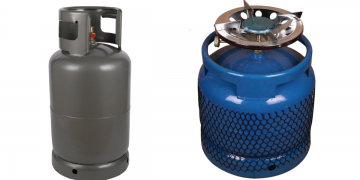The cost of cooking gas in Nigeria is on the rise and this is becoming burdening for many Nigerians. Cooking gas also known as Liquefied Petroleum Gas (LPG), is highly patronized in West African countries for cooking purposes. It has become one of the commodities generally embraced by people because of how easy it has made life.
Most houses prefer to use it for cooking because of its efficiency, effectiveness and durability. Meals are now made with less stress compared to the age of firewood and kerosene stove. Although some people still maintain that meals prepared with firewood are the sweetest; well, that’s a discussion for another day.
However, the rise in the cost of cooking gas is really posing a threat to its users because between 2020 and now, the price of 1kg of gas skyrocketed from 350 Naira to about 800 and even a thousand naira in some Nigerian states.
Homes are beginning to return to the era they left behind, the era of firewood; not even Kerosene because the price is also high – pegged at 800 – 1000 Naira per litre. And only a handful of Nigerians can afford it.
Many people have blamed the hike in price on the recent invasion of Ukraine by Russia, claiming that Russia holds a larger production capacity of LPG worldwide and other theories.
The Nigerian National Petroleum Corporation (NNPC) recently said the corporation is working on veritable ways to increase the supply of Liquefied Petroleum Gas (LPG) in a bid to force down its price.
The price of other petroleum products have also skyrocketed, as many states are already facing scarcity in the country while some states have to buy at a very bourgeois price.
The escalating price of cooking gas inevitably leads to an increase in the cost of food items in the market as the purchasing power continues to dwindle thereby forcing most traders to increase their prices.
Despite the incapabilities of many homes to afford cooking gas and Kerosene, the use of firewood should not be encouraged because it contributes to the destruction of the environment and climate. The authorities have to tackle this issue abruptly, given the implications involved.
A few highlights of the palpable outcomes of the high cost of cooking gas;
- People will resort to the use of firewood which will damage the ozone layer thereby causing more heat in the ecosystem.
- The price of food commodities in the market will increase as the high cost of LPG is drastically on the high side.
- Food vendors, outlets will be affected and the cost of getting ready meals will be on the increase.
- Ultimately, the poor masses suffer the adverse effect and the living standard of people will be further impoverished
Cost of Cooking Gas in Nigerian Cities
The cost of cooking gas varies across the different states. A breakdown of the cost of a Kilogram of cooking gas in some Nigerian cities is given below:
- Abia: 900 – 1000
- Anambra: 800
- Bayelsa: 900
- Benue: 800
- Calabar: 900
- Delta: 1000
- Ebonyi: 900
- Imo: 800
- Jos: 800
- Kaduna: 650
- Kano: 750
- Katsina: 650
- Kwara: 750
- Nasarawa: 800
- Ogun: 800
- Oyo: 900
- Rivers: 800
In conclusion, the Government should give urgent attention to the gas crisis in the country by granting concessions to importers and people that want to invest in the domestic gas production business. We need to see a lot of commitment to all the international pacts on climate change, including the recent ones in Paris and Glasgow aimed at reducing the use of coal, firewood and encouraging greenhouse gas emissions.















